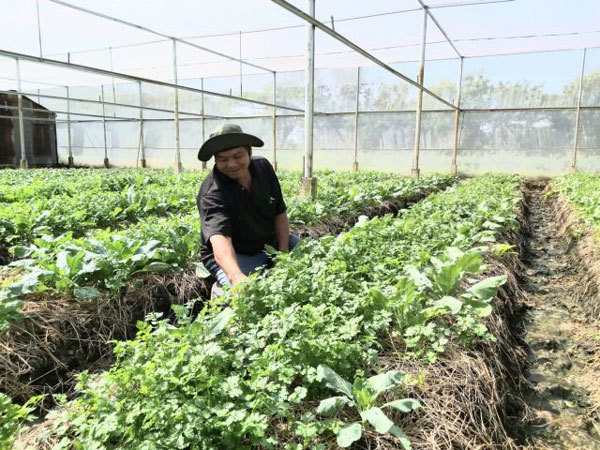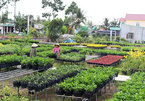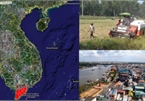 |
|
A farmer in the Mekong Delta province of Soc Trang's My Xuyen District tends to his vegetable garden which has been equipped with a high-tech watering system.
|
What are the main causes of the drought in the Mekong Delta?
In July last year, we forecast the Mekong Delta would be hit by a serious drought due to the El Nino phenomenon. In September 2019, the Mekong Delta region suffered its most serious drought in more than 50 years, even during the rainy season. The shortage of water became a big problem for the operation of hydropower plants in the region and for agricultural production. Hydropower plants do not cause the problem, but they store a big volume of water to operate in the dry season, which can slow the flow in rivers and streams.
Drought and salinity in the Mekong Delta have become more and more serious. One of the reasons is natural changes in the delta, and weak flow on the Mekong River has had negative impacts and made the soil more saline.
In recent years, salinity has become more serious in the Mekong Delta due to changes in the region. The dyke system has prevented floodwater from flowing into the rice fields, and diverted it to the sea. Worse still, in the dry season, the weak flow of the Mekong River has led to saline intrusion.
Does this mean the Mekong Delta is prone to drought?
A strong El Nino is a signal for a dry year. In the context of climate change, extreme weather will become normal. To respond to this weather we should develop measures to respond to it while developing a long term strategy for the Mekong Delta region.
What measures should we adopt to respond to climate change while maintaining sustainable development in the Mekong region?
The best way is to adjust our agricultural production seasons to avoid the peak time of drought and salinity in late March and early April. In other words, we should understand the natural conditions of each region, particularly the period of saline intrusion from the Mekong River. For example, the Ca Mau Peninsula does not take water from the Cuu Long River. That’s why farmers living in the peninsula have used surface water to grow rice in the first six months of the year and avoided rice cultivation in the dry season.
Government Resolution 120 recommends that farmers in the Mekong Delta should give priority to aquaculture and crop cultivation rather than focusing on rice production. The resolution also calls on people living in the region to consider saline water and fresh water as natural resources. That’s why in the long run, the resolution says that farmers living in the upper reaches of the water resource should plant only two rice crops in a year – not three crops as at present. Meanwhile, for coastal areas, the resolution recommended that farmers should grow their crops in accordance with the natural conditions in their localities.
How about the issue of fresh water supply for people living in coastal areas in the dry season?
The issue of fresh water should be treated separately. Every household should have water tanks to conserve water for daily use or even dig ponds to have fresh water. However, we should also make sure people differentiate household water from production water.
What should we tell farmers in the Mekong Delta to change their agricultural methods in accordance with Government Resolution 120?
The Government should have separate programmes to help the Mekong Delta change. For example, a programme to restructure the sector to help farmers organise production, including the development of their product brand names and marketing.
Farmers in the Mekong Delta will face many difficulties this year, including severe drought. The Ministry of Agriculture vows to stand by the Mekong Delta farmers to help them overcome their difficulties. — VNS

Vietnam's Mekong Delta agriculture adapts to climate change
The Mekong Delta has restructured agriculture towards climate-change adaptation and market demand by establishing specialised farming areas for its key agricultural products.

Mekong Delta re-plans in response to climate change
After nearly two years of implementing a government resolution on sustainable and climate resilient development of the Mekong Delta, known as Resolution 120, a number of policies have been revised to enable the region’s comprehensive development.

Mekong Delta to have quality breed sources for fishery, fruit and rice
The Ministry of Agriculture and Rural Development has implemented several measures to develop the best breeding sources to produce seeds for the delta’s fishery, fruit and rice sectors by 2025.
 Nguyen Huu Thien, an independent ecologist in the Mekong Delta, talks to Nhân Dân (The People) about the causes of saline intrusion in the Mekong Delta and measures to cope with it.
Nguyen Huu Thien, an independent ecologist in the Mekong Delta, talks to Nhân Dân (The People) about the causes of saline intrusion in the Mekong Delta and measures to cope with it.